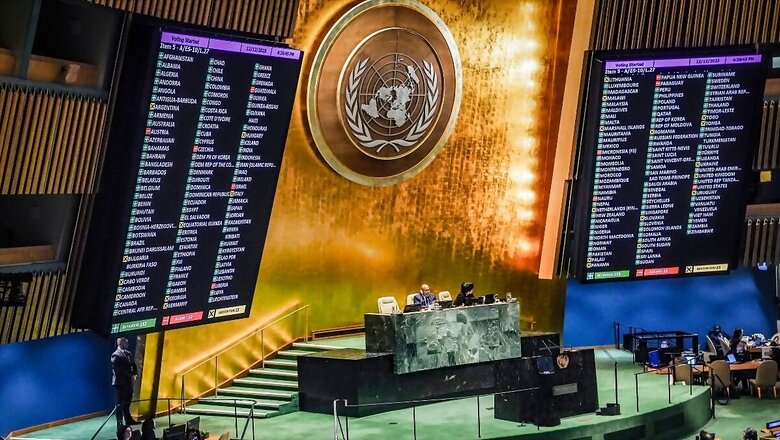
views
Reviewing edited books is a bit like trying to critique a potluck dinner — each dish or chapter comes from a different chef and you’re never quite sure if you’re tasting someone’s secret family recipe or their first disastrous attempt at cooking. Now, when the book delves into topics like power, legitimacy and world order, the task becomes akin to judging a gourmet food competition where every dish is laced with strong spices. It’s intense and complex, and you might find yourself questioning the legitimacy of your palate.
The task grows even more daunting when the first editor of the book is someone who once taught you international relations during your undergraduate days. It’s like reviewing your professor’s cooking — it’s hard not to be biased when they taught you how to use the spices.
Power, Legitimacy, and World Order: Changing Contours of Preconditions and Perspectives emerges as a vital and expansive collection that delves deeply into the concepts of power and legitimacy through a range of insightful perspectives. Authored in 2022 and published globally in 2023 — with a South Asia edition released this year — the anthology’s themes are not only highly pertinent in 2024 but are poised to stay relevant well into the future. This book expertly addresses the enduring complexities of global governance, making it an essential resource for understanding how power and legitimacy shape the world order.
It begins with an exploration of the reasons behind the decline of international cooperation, setting the stage for a deeper investigation into the concept of legitimacy, in international relations theories and practices. The chapter, ‘Power, Authority, and Shifting Sands of Legitimacy’, offers a technically rigorous and philosophically rich examination of the constructs of power, authority, and legitimacy. It adeptly uses classical and modern philosophical theories to frame these concepts within the context of both domestic and international politics. The inclusion of thinkers like Hobbes, Locke, Rousseau, Rawls, and Marx adds a depth of intellectual rigour that is both impressive and engaging.
This introductory framework effectively primes the reader for the nuanced discussions that follow, which span across various geopolitical contexts and theoretical lenses.
The anthology is structured around several major themes, each dissecting different aspects of power and legitimacy from theoretical, historical, and practical viewpoints. These include the efficacy of international organisations in maintaining global peace, the role of technology in shaping political authority, and the impact of rising powers on established international norms.
One key theme discussed is the challenge of upholding international order in a period marked by significant geopolitical shifts. For example, a chapter dedicated to the United Nations examines its struggle to remain relevant as global power becomes more diffused. The book critiques the UN’s ability to enforce international laws and norms in crises such as the ongoing conflict in Ukraine, highlighting the limitations posed by the veto powers of permanent Security Council members.
Another central theme is the examination of how nations project their legitimacy on the global stage amidst internal and external pressures. The book includes a case study on China’s Belt and Road Initiative, analysing it as a strategy for China to enhance its soft power and reshape global perceptions of its legitimacy. This analysis is juxtaposed with discussions on the US’ fluctuating international stance under different administrations, illustrating how domestic politics significantly influence global perceptions of legitimacy.
One of the book’s major strengths is its inclusion of a wide array of perspectives, covering regions such as the US, Europe, South Asia, Southeast Asia, Latin America, and Africa. This broad geographical coverage enriches the discussion by highlighting how different regions interpret and implement the concepts of power and legitimacy.
While the book provides a rich theoretical and empirical analysis, some chapters could benefit from a more critical perspective. For instance, the chapter on the United Nations touches on the need for reform but lacks a detailed critique of what specific changes are necessary to enhance the UN’s effectiveness and legitimacy in the contemporary world. A more critical approach could provide practical insights and recommendations for policymakers and scholars.
The book could also improve by integrating more discussions on emerging global threats such as cybersecurity, climate change, and non-state actors. These issues are increasingly important in international relations and could impact the concepts of power and legitimacy significantly. Future editions could include dedicated chapters on these topics to provide a more comprehensive overview of the challenges facing the global order.
Some chapters are densely packed with complex theoretical discussions, which might be challenging for readers who are not well-versed in political theory. While the scholarly depth adds value, the book could benefit from including more accessible content or summaries that make the key arguments more digestible to a broader audience.
Overall, Power, Legitimacy, and World Order: Changing Contours of Preconditions and Perspectives is a valuable contribution to the field of international relations, offering a nuanced exploration of critical concepts that define global politics. Students, academics, policymakers, and diplomats alike will find immense value in its nuanced discussions across the chapters. This book serves as an essential read for those seeking a deeper understanding of global shifts in power dynamics and their implications on international affairs and global governance structures.
Power, Legitimacy, and World Order: Changing Contours of Preconditions and Perspectives, by Sanjay Pulipaka, Krishnan Srinivasan and James Mayall (eds), South Asia Edition, Routledge
(Aditya Sinha (@adityasinha004) is Officer on Special Duty, Research, Economic Advisory Council to the Prime Minister. Views expressed in the above piece are personal and solely those of the author. They do not necessarily reflect News18’s views)
















Comments
0 comment